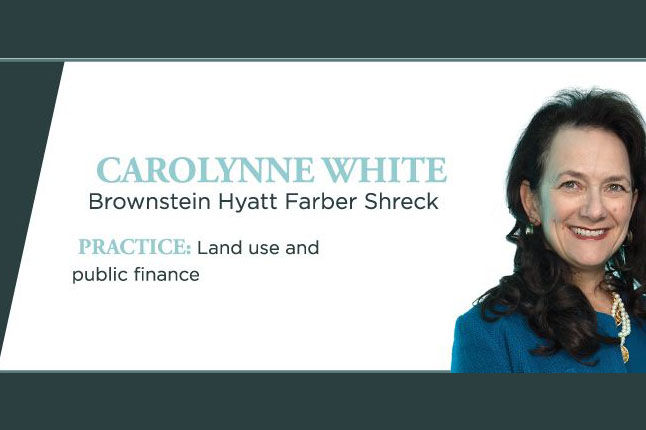
Before she first landed a job with Brownstein Hyatt Farber Shreck 14 years ago, Carolynne White interviewed with firm co-founder Steve Farber. They looked out his office window as he pointed out iconic projects he’d worked on over the years: Mile High Stadium, Coors Field, the Denver Justice Center, among other developments. White immediately saw the appeal of real estate-related legal work.
“What really grabbed me was how tangible it is, the results of your work,” she said. “It’s a very physical thing. A building is built, and people can go there and live, or shop or work.” That was in stark contrast to her previous occupation in the legislature as a staff attorney for the Colorado Municipal League. Success in that role, she said, meant that either nothing happened or a couple sentences got added to a statute.
But White’s practice in land use and development would end up combining her savvy in navigating policy agendas with nuts-and-bolts knowledge of real estate law and public finance. She has worked on projects from the Fitzsimons Hotel and Conference Center in Aurora to the Miller’s Landing commercial development in Castle Rock. She has advised communities from Golden to Pueblo. The results of her legal counsel are every bit as tangible as the icons Farber showed her in that interview.
Part of what made 2017 a big year for White was her role as lead counsel to the Colorado Rockies, who are planning a mixed-use development where Coors Field’s west parking lot currently sits.
With a plan that includes a hotel, condos, office space and a plaza that can hold concerts, farmers markets and other programmable events, the project is estimated to cost $300 million to build.
Given Coors Field’s prominence and the fact that the project’s documents will be public (a stadium district owns the property, not the Rockies), she has to take public scrutiny into consideration throughout the process. “A lot of focus is going to be on it, and it has to be just right.”
Where White has really made a name for herself in her practice, however, is in urban renewal counseling. When she first got into that niche 20 years ago, she was drawn to how it’s often more complicated than garden-variety public financing and real estate work. “It’s harder, it’s more complicated, there are more stakeholders, and so I think it’s more challenging and therefore more interesting.”
In urban renewal projects, the city, the developer and neighboring property owners often have different ideas as to what should be done with the underperforming property being eyed for development.
White has been helping to steer clients through those changes made to Colorado’s urban renewal law in 2015 and draw up urban renewal plans, like what the town of Delta adopted in November.
Delta brought her in to help with using urban renewal to revitalize its downtown with a riverside hotel, among other structures.
The project is orders of magnitude smaller than the Rockies project, but its impact on the community of about 9,000 will be proportionally huge, she said.
White advocates for urban renewal authorities and cities not just in the projects she handles but also at the State Capitol, where she has been involved in negotiations surrounding urban renewal statute.
Outside of her legal work, White also mentors students at the University of Denver Sturm College of Law as well as female lawyers at Brownstein. The most common piece of advice she gives, she said, is the same for both male and female attorneys: Understand the issues and prepare, but then don’t be shy when the time comes to make your voice heard.
“Be confident in what you have to say. Speak up if you have something to say. But that’s only if you really have done your homework.”
— Doug Chartier

